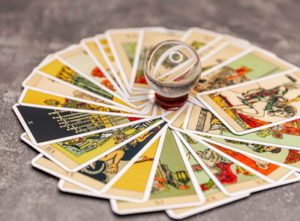 Betting is a practice in which it feels as though the results are out of our hands. When we pick a number to bet on on the roulette wheel, we do so based on any number of random factors, including the likes of birthdays and house numbers. If the ball then lands on our number then it is not uncommon for bettors to feel as though it did so because of fate or some other factor entirely out of our control. Equally, when things go wrong in our betting we will often blame something or someone else other than ourselves, abdicating responsibility.
Betting is a practice in which it feels as though the results are out of our hands. When we pick a number to bet on on the roulette wheel, we do so based on any number of random factors, including the likes of birthdays and house numbers. If the ball then lands on our number then it is not uncommon for bettors to feel as though it did so because of fate or some other factor entirely out of our control. Equally, when things go wrong in our betting we will often blame something or someone else other than ourselves, abdicating responsibility.
The psychology of betting is such that many people ignore the reality of gambling and instead focus on things that aren’t all that relevant. Hindsight bias is a good example of this, feeling as though we knew something would happen after the event, even though we didn’t demonstrate that feeling by actually betting on the outcome. Think also of the hot hand fallacy, in which we convince ourselves that we’ll keep winning when we’ve been winning even though the facts are against us, simply because of faith rather than understanding the reality.
Believing In Fate
 Because the outcome of a bet is often out of our control, it is common for people to believe in the idea of fate. How this manifests itself will differ from person to person, but in essence it involves putting control of an outcome in the hands of a higher being. Religious people will imagine that they have won because God willed it to be so, whilst those that don’t believe in God might put the responsibility for their success on the universe. It is the idea that it isn’t because of us or something we’ve done that we’ve won but because we ‘deserve it’.
Because the outcome of a bet is often out of our control, it is common for people to believe in the idea of fate. How this manifests itself will differ from person to person, but in essence it involves putting control of an outcome in the hands of a higher being. Religious people will imagine that they have won because God willed it to be so, whilst those that don’t believe in God might put the responsibility for their success on the universe. It is the idea that it isn’t because of us or something we’ve done that we’ve won but because we ‘deserve it’.
This abdication of responsibility can mean that people are less like to think about the choices that they’re making. Think of something like blackjack, in which we know statistically that playing basic strategy will increase the odds in our favour, or decrease the House Edge if you prefer to think of it that way. Regardless, playing basic strategy is the sensible thing for blackjack players to do, yet some won’t bother because they think that if they win it is down to fate or some sort of higher power rather than their own decisions.
In other words, countless bettors will trust to fate more than mathematics when it comes to the decisions that they make. This is in spite of the fact that the evidence is there for anyone that wants to consider it to help them realise that fate, fairness and even God have no place in gambling. Millions of people gamble around the world on a regular basis but only a small percentage of them ever win in the long run; are are really saying that the small percentage are the only ones that ‘deserve’ to be successful when it comes to gambling outcomes?
We Want Control
 Gambling is an activity that is inherently risky and therefore lacks control, in fact, this is often what people enjoy about gambling more so than even winning. For some, the way to counter this is by adding their own sense of control to any given situation. Think of the bettor that has a rabbit’s foot that they rub when stood around the craps table, for example. The majority of sensible people know that a rabbit’s foot isn’t going to make any difference to the direction that dice go in, but they rub it anyway because they want to take back some sense of control over something that is out of their hands. That is what all superstitions are really, a grab for control.
Gambling is an activity that is inherently risky and therefore lacks control, in fact, this is often what people enjoy about gambling more so than even winning. For some, the way to counter this is by adding their own sense of control to any given situation. Think of the bettor that has a rabbit’s foot that they rub when stood around the craps table, for example. The majority of sensible people know that a rabbit’s foot isn’t going to make any difference to the direction that dice go in, but they rub it anyway because they want to take back some sense of control over something that is out of their hands. That is what all superstitions are really, a grab for control.
If the person rubbing the rabbit’s foot wins, their victory will be because of the act of rubbing the foot, not because they made the correct bet. If they don’t win, the loss will have nothing to do with the rabbit’s foot being useless and entirely due to some random outside factor, such as the baize not rubbing the right way. Superstition allows people to remove responsibility from their decision making and put it all down to something else entirely, which isn’t a healthy way to consider the decisions we make whilst betting.
Why It Matters
 The more that we remove ourselves from any given decision making, the more that we put ourselves in a situation where we will think that our bad fortune will change as soon as we get the outside factors right. Someone betting on a football match didn’t lose their bet because they failed to correctly research the opposition team, they lost it because didn’t touch wood before they place their wager. Accordingly, touching wood correctly next time will allow them to win their bet, as long as they do it all in the same way as they did last time they won.
The more that we remove ourselves from any given decision making, the more that we put ourselves in a situation where we will think that our bad fortune will change as soon as we get the outside factors right. Someone betting on a football match didn’t lose their bet because they failed to correctly research the opposition team, they lost it because didn’t touch wood before they place their wager. Accordingly, touching wood correctly next time will allow them to win their bet, as long as they do it all in the same way as they did last time they won.
It is that people keep on making the same mistakes when it comes to the bets that they’re placing, rather than realising what mistakes they’re making and looking to correct them. The person placing the football bet could have found out that the team that he bet on would be without their star striker if he’d done a bit of research online before deciding upon their wager. Instead, they did what they usually do and ensured that they touched the wood correctly, rubbed the rabbit’s foot from back to front or whatever other superstition they opt for.
Albert Einstein is often credited with the saying,
“Insanity is doing the same thing over and over and expecting different results.”
Whether it was him that said it or not, the reality is that bettors that want to win more often will look at the decisions that they have taken in the past and figure out why they got them wrong. They will not imagine that their success or lack thereof is due to God, a rabbit’s foot or some other thing that is completely irrelevant to their betting experience. Instead, they will know that it is all down to the decisions that they made.
Problem Gambling
 The best way of falling foul of the world of problem gambling is by taking responsibility for your own decisions. The more that you look to abdicate that responsibility, the more likely it is that you’ll continue to make mistakes with your betting and not attempt to course correct. This can lead to the sense that you will win at some point, it’s just a matter of time until your luck changes and you’ll hit the big jackpot that you need in order to get all your money back. Just one more win, just one big victory thanks to the fates, that’s all you need.
The best way of falling foul of the world of problem gambling is by taking responsibility for your own decisions. The more that you look to abdicate that responsibility, the more likely it is that you’ll continue to make mistakes with your betting and not attempt to course correct. This can lead to the sense that you will win at some point, it’s just a matter of time until your luck changes and you’ll hit the big jackpot that you need in order to get all your money back. Just one more win, just one big victory thanks to the fates, that’s all you need.
By refusing to allow yourself to go down the road of blaming fortune, superstition or some outside influence, you’re putting yourself in a position whereby you can take stock of your situation and acknowledge that your gambling is out of control. Ironically, removing the feeling of control that you give yourself by adopting a superstition, you might actually take more control of your betting and what is happening to your money. The decision to place a bet is always yours and yours alone, so it is important that you never lose sight of that.
